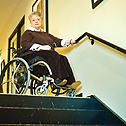Deadlines both made and spayed bills last week. Many bills passed in the two chambers of the Mississippi Legislature, but now face conference committee to bang out their differences.
Senate Bill 2929, which makes knowingly selling or purchasing stolen metal a felony, punishable by up to 10 years in prison, passed the House floor. The bill is aimed at scrap metal dealers who have been getting public scrutiny for their part in massive copper and metal theft crimes around Jackson and other cities.
Advocates of the bill say the rising price of copper has triggered a rash of vandalism in metro areas, while opponents say proving the metal is stolen will be difficult and a new problem with which legitimate scrap dealers will have to contend. Meanwhile, the Senate finished hammering on a pay raise for some state officials. House Bill 859, formerly a bill granting pay raises to county and state public officials—including legislators—became a bill that doesn't include lawmakers. That bill, now amended, differs from the House bill, and will now likely be re-hashed in joint committee meetings.
The Mississippi Senate passed House Bill 1405 with a motion to reconsider last Thursday. The bill finances the state's trauma-care system through a fee increase of various state-issued licenses and permits, including car tags, inspection stickers, drivers licenses and gun permits.
The bill, which is also heading to a joint conference between the House and Senate, could raise $40 million for the beleaguered system.
The trauma-care system is grossly under-funded, yet required to ensure that patients headed to emergency rooms get service once they arrive. Most Mississippi hospitals don't have to treat all emergency-room patients, and some are ducking out of the system because of the high costs generated through unpaid emergency room bills and insufficient insurance payments.
Mississippi, the poorest state in the nation, has a high percentage of uninsured residents or insured residents whose deductibles are too high to afford the routine doctor visits that prevent an emergency-room visit.
Many state residents' first doctor visit regarding an illness is with the emergency room, according to some health officials.
Public Health and Welfare Committee Chairman Hob Bryan, D-Amory, told reporters he expected the bill to be a law before the end of the session, partly because both houses want the system funded, but also because few lawmakers are willing to deliberately let the popular program hang.
Legislators are attempting to protect local catfish producers by passing House Bill 728, which will require labels on all imported catfish identifying its country of origin. The Senate amended the bill earlier this week and sent it back to the House for approval. Local producers have been pushing hard for the House to pass some form of catfish legislation, arguing that cheaper imported catfish is putting a dent in local sales.
The House, meanwhile, passed SB 2246, which charges the State Drug Court Advisory Committee to come up with ways to expand the number of drug courts in the state. Drug courts have proven a cheaper and more effective alternative to incarceration, according to many local judges and prosecutors. That bill is on its way to the governor's office for a signature.
Gov. Haley Barbour's appointed commission to study the state's tax system had their first meeting this week. The commission, composed of 30 figures from the business community—including business owners, bean-counters and a professor or two—quickly ticked off people by initially meeting behind closed doors.
The governor later announced that the commission's meetings, from here on out, are to be open. Commission leader Leland Speed told The Clarion-Ledger that the commission would be meeting roughly every month.
The commission is expected to deliver a report in August, though some legislators said they did not expect it to deliver earth-shaking revelations.



Comments
Use the comment form below to begin a discussion about this content.
comments powered by Disqus